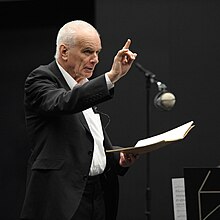Mefistofele is an opera in a prologue and five acts, later reduced to four acts and an epilogue, the only completed opera with music by the Italian composer-librettist Arrigo Boito. The opera was given its premiere on 5 March 1868 at La Scala, Milan, under the baton of the composer, despite his lack of experience and skill as a conductor.

Saint Magnus Erlendsson, Earl of Orkney, sometimes known as Magnus the Martyr, was Earl of Orkney from 1106 to about 1115.
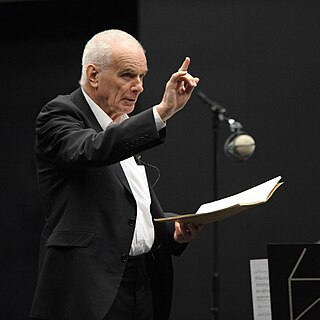
Sir Peter Maxwell Davies was an English composer and conductor, who in 2004 was made Master of the Queen's Music.
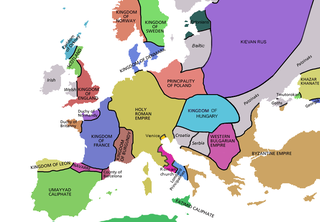
The Earldom of Orkney is the official status of the Orkney Islands. It was originally a Norse feudal dignity in Scotland which had its origins from the Viking period. In the ninth and tenth centuries it covered more than the Northern Isles (Norðreyjar) and included Orkney, Shetland, Caithness, and Sutherland. The ruling position of Jarl or Earl of Orkney was heritable.
Haakon Paulsson was a Norwegian jarl (1105–1123) and jointly ruled the earldom of Orkney with his cousin Magnus Erlendsson. Their lives and times are recounted in the Orkneyinga saga, which was first written down in the early 13th century by an unknown Icelandic author.
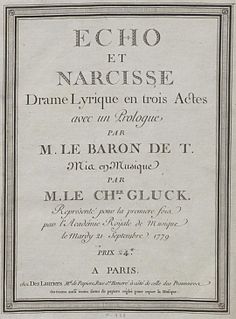
Écho et Narcisse is a 1779 drame lyrique in three acts, the last original opera written by Christoph Willibald Gluck, his sixth for the French stage. The libretto, written by Louis-Théodore de Tschudi, tells the story of the love between Echo and Narcissus.

Hans Heiling is a German Romantic opera in 3 acts with prologue by Heinrich Marschner with a libretto by Eduard Devrient, who also sang the title role at the première at the Königliche Hofoper, Berlin, on 24 May 1833, and went on to become Marschner's most successful opera. The opera brought the composer a considerable reputation, although this did not materially affect his position in Hanover, where he was music director of the Court Theatre. Like Marschner's other great success, Der Vampyr, the plot of Hans Heiling makes great use of supernatural elements. As with several of his operas, Hans Heiling is based on a folk legend.
Il prigioniero is an opera in a prologue and one act, with music and libretto by Luigi Dallapiccola. The opera was first broadcast by the Italian radio station RAI on 1 December 1949. The work is based on the short story La torture par l'espérance from the collection Nouveaux contes cruels by the French writer Auguste Villiers de l'Isle-Adam and from La Légende d'Ulenspiegel et de Lamme Goedzak by Charles De Coster. Some of the musical material is based on Dallapiccola's earlier choral work on a similar theme, Canti di prigionia (1938). Dallapiccola composed Il prigioniero in the period of 1944–1948. The work contains seven parts and lasts about 50 minutes. The musical idiom is serialism, and it is one of the first completed operas using that compositional method.

Lear is an opera in two parts with music by the German composer Aribert Reimann, and a libretto by Claus H. Henneberg, based on Shakespeare's tragedy King Lear.

Orlando paladino, Hob. 28/11, is an opera in three acts by Joseph Haydn which was first performed at Eszterháza on 6 December 1782. The libretto by Nunziato Porta is based on another libretto, Le pazzie d'Orlando, by Carlo Francesco Badini, itself inspired by Ariosto's epic poem Orlando furioso. The opera was described as a dramma eroicomico and the plot mixes heroic and comic elements. It was Haydn's most popular opera during his lifetime. While in Prague, Mozart conducted a few performances of the opera. The Pennsylvania Opera Theater presented the United States premiere of the work at the Trocadero Theatre, Philadelphia, in March 1982 with John Gilmore in the title role.
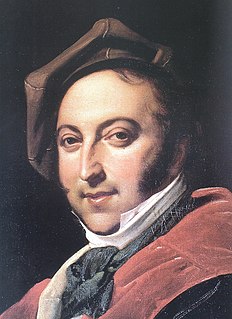
Adina is an operatic farsa in one act by Gioachino Rossini with a libretto by Marchese Gherardo Bevilacqua-Aldobrandini. The opera develops the popular theme of the "abduction from the seraglio". The première took place on 22 June 1826 at the Teatro Nacional de São Carlos, Lisbon.

Bianca e Falliero, ossia Il consiglio dei tre is a two-act operatic melodramma by Gioachino Rossini to an Italian libretto by Felice Romani. The libretto was based on Antoine-Vincent Arnault's play Les Vénitiens, ou Blanche et Montcassin.
L'attaque du moulin is a drame lyrique (opera) in four acts by the French composer Alfred Bruneau. The libretto, by Louis Gallet with the collaboration of Émile Zola, is based on a short story by Zola. Zola's story is about the Franco-Prussian War, but the setting of the opera was changed to the period of the French Revolution.
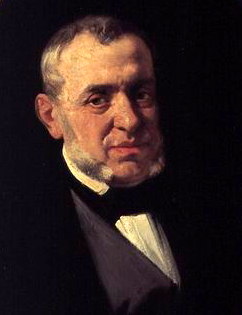
Orazi e Curiazi is an opera by the Italian composer Saverio Mercadante. It takes the form of a tragedia lirica in three acts. The libretto, by Salvadore Cammarano, is based on the Roman legend of the fight between Horatii and Curiatii. It was first performed at the Teatro San Carlo, Naples, on 10 November 1846.

Neues vom Tage is a comic opera in three parts by Paul Hindemith, with a German libretto by Marcellus Schiffer.

The Perfect Fool is an opera in one act with music and libretto by the English composer Gustav Holst. Holst composed the work over the period of 1918 to 1922. The opera received its premiere at the Covent Garden Theatre, London, on 14 May 1923. Holst had originally asked Clifford Bax to write the libretto, but Bax declined.

Fennimore und Gerda is a German-language opera with four interludes, by the English composer Frederick Delius. It is usually performed and recorded in English, as Fennimore and Gerda in a translation by Philip Heseltine. The German libretto, by the composer himself, is based on the novel Niels Lyhne by the Danish writer Jens Peter Jacobsen. In neither German nor English is the libretto highly regarded; rather, the work is considered an "orchestral opera", limited in its dramatic appeal but voluptuous and engaging in its instrumental texture.
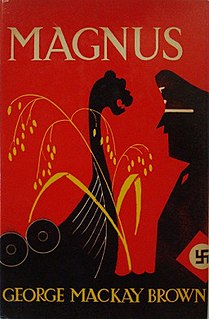
Magnus is a novel by the Orcadian author George Mackay Brown. His second novel, it was published in 1973. it is a fictional account of the life and execution of the twelfth century Saint, Magnus Erlendsson, Earl of Orkney.

La romanziera e l'uomo nero is an 1831 one-act farsa with music by Gaetano Donizetti and an Italian libretto by Domenico Gilardoni, possibly based on the 1819 play La donna dei romanzi by Augusto Bon. Other suggested sources include L'homme noir (1820) by Eugene Scribe and Jean-Henri Dupin and Le coiffeur et le perruquier (1824) by Scribe, Édouard-Joseph-Ennemond Mazères and Charles Nombret Saint-Laurent.
Il trionfo di Clelia, Wq. 31, is an opera composed by Christoph Willibald Gluck. It takes the form of a dramma per musica in three acts. The Italian-language libretto by Pietro Metastasio is based on several semi-legendary narratives concerning the founding of the Roman Republic. The opera premiered on 14 May 1763 at the Teatro Comunale di Bologna. Although rarely performed since then, it was revived in London in 2012 at the Royal Opera House's Linbury Studio.
